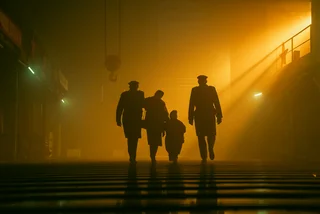The Czech playwright and polymath Jára Cimrman didn’t actually exist, but that little technicality has not kept him from being an integral part of Czech popular culture, and a key for understanding Czech humor.
A project to bring his work to an English-speaking audience is now on its fifth play. “Plum” (Švestka) ranks as one of the best efforts, along with “The Stand-In” (Záskok) and “The Conquest of the North Pole” (Dobytí severního pólu).
The next performances of "Plum" at Žižkovské divadlo Jarý Cimrmana are on Nov. 18, Jan. 27, Feb. 24, and June 9.
The two other translated efforts “The Pub in the Glade” (Hospoda Na mýtince) and “The Act” (Akt), while still worth seeing, are a bit weaker. All of the plays have occasional performances, with about one each month.
“Plum,” on the other hand, serves as a good starting point for people interested in Czech humor, and also stands on its own as just plain funny.
Czech humor at its best
Actor and writer Zdeněk Svěrák along with the late Jiří Šebánek and Ladislav Smoljak, are often credited with creating the Cimrman character in 1966. Svěrák, though, insists that Cimrman was a real but unsuccessful writer and inventor born sometime in the late 19th century in Vienna, and that he is simply the caretaker of the Cimrman legacy.
The plays are done in cooperation with Svěrák’s Czech theater troupe, which still stages them in the original version. The English-speaking cast uses the same stage, props, and copies of the costumes.
Back in 2014, Svěrák was skeptical that the plays, with their very specific humor and puns, would work in translation. But at the premiere of the first play, “The Stand-In,” he said he was very surprised at how well the translation captured the mood of the text and at how even Czechs in the audience appreciated it.
The English version of “Plum” has several puns that did not appear in the original. One, for example, used the words “tired” and “retired.” Another riffs off of the similarity of the Czech word for concrete, “beton,” and the phrase “bet on.”
Co-translator Brian Stewart said that these changes were in the spirit of the original, as much of the Czech wordplay doesn’t work in English and other jokes had to be invented. For the fifth outing, the translators seemed to be a bit freer and more comfortable in taking liberties, and there are fewer dry stretches in the dialogue. Stewart worked with Svěrák’s daughter Hanka Jelínková on translating this and the other plays.
Running off the rails
The evening is divided into two parts. The first is a lecture by “experts” about Cimrman and some background as to why he wrote the play. The second part is the play itself. The closest equivalent in English to the plays would most likely be a single sketch from “Monty Python’s Flying Circus” drawn out to fill an hour.
The standout in the intro this time is local actor Curt Matthew, who tries to explain a simple point but goes off on a series of unrelated tangents. It seems like improvisation, but actually mostly matches the English-language surtitles above the stage. The titles are there to help non-native speakers keep up and are also helpful as laughter often drowns out a line.
The lecture somehow devolves into a line dance about the railway, with more and more actors joining in, just like cars being attached to a train.
The play itself is a rather simple and very Czech comedy of errors and odd random events. By tradition, at least according to the play, the station master should have the right to collect plums from a tree on the railway land next to the small rural station. But the tradition is up for interpretation once the former station master also lays claim to them.
Pining for true love and some fresh plums
At the same time, the current station master, played by Gabriel Andrews, is lonely and hopes that one day the perfect woman will get off a train and decide to stay there with him. The main problem is that the station is so small that trains almost never stop there, and few women, perfect or otherwise, ever happen by.
Andrews is a relative newcomer to the Cimrman troupe, not having been in the original cast of the first few plays. He finds the right tone with the very dry material and doesn’t try to oversell the ridiculous situation his character is in. Andrews had small roles in the Czech film “Zátopek” and the World War II dark comedy “Jojo Rabbit.”
Matthew continues with his easily distracted character, and all of the cast members have to struggle to keep him focused on the project of who can gather the plums. He is quite convincing again as someone who can’t follow a very simple idea for more than a few seconds.

Ben Bradshaw has a large role in the plum plot, appearing in a wheelchair. This hinders his ability to climb the tree, but not his ability to urge people to actually focus their attention on getting the plums. The Czech actor who originally played the role had to use a wheelchair due to an injury that left him partly paralyzed, so wheelchairs were written into the plots of the later Cimrman plays.
Bradshaw has several notable film and TV credits including a recurring role in the original UK version of “The Office.” He will soon be in the period film “Chevalier,” and appears in the recently released trailer for that film.
Veteran cast member Michael Pitthan has a supporting role as a person who stumbles onto the action while painting tourist trail signs on trees, which threatens to slow the plum collection even more.
He can currently be seen as Captain Ernst Von Vanselow in “All Quiet on the Western Front” on Netflix and appeared in the TV series “Das Boot” and “Atlantic Crossing” among other credits.
There is also the railway clerk’s love story, but how that is handled is best left as a surprise as it must be seen to be believed.
Cimrman street?
Jára Cimrman holds a special place in Czech culture. A 2005 poll by Czech Television to name the greatest Czech of all time was bombarded with votes for Cimrman. The contest rules had to be changed to specify that the winner must be a real historical figure, and Cimrman was disqualified.
Top honors eventually went to Emperor Charles IV, followed by Presidents Tomáš Garrigue Masaryk and Václav Havel.
There have also been efforts to rename a street in Žižkov after him, but again the authorities prefer a real person, so this seems unlikely for now. In 2016, a Google Doodle honored Cimrman for his 50th birthday, but the image was only available in Czechia.












 Reading time: 5 minutes
Reading time: 5 minutes 



























